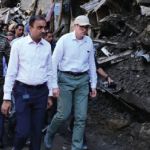The speculations about Prime Minister Narendra Modi’s visit to Moscow, published in late June, were immediately picked up by the world media. Everyone understood that the interaction with Russia’s leadership would carry important political and symbolic significance as it would be the first foreign bilateral visit after India’s general elections this year. Thus, Modi decided to break an informal tradition of visiting the immediate South Asian neighbourhood first. Being the first visit to Russia’s capital since 2015, the visit marked the country’s commitment to the Russia–India dialogue format, which has been postponed for three years, excluding the meeting on the sidelines of the Shanghai Cooperation Organisation (SCO) summit in Uzbekistan in 2022. The suspension clearly resonated with the consistency of the Russia–China dialogue, as there were three back-to-back personal meetings. The convening of annual summit-level meetings was a main provision of the Declaration on Strategic Partnership signed in October 2000. Therefore, bilateral exchanges between the heads of states were frequent until the COVID-19 pandemic. Following the pandemic, President Putin visited India in 2021, which makes it Modi’s turn to visit Russia. During EAM Dr S Jaishankar’s visit to Russia late last year, he stated that the Prime Minister would visit Russia in 2024. The convening of annual summit-level meetings was a main provision of the Declaration on Strategic Partnership signed in October 2000. Therefore, bilateral exchanges between the heads of states were frequent until the COVID-19 pandemic. Following the pandemic, President Putin visited India in 2021, which makes it Modi’s turn to visit Russia. During EAM Dr S Jaishankar’s visit to Russia late last year, he stated that the Prime Minister would visit Russia in 2024. The foreign policy equation that India’s decision-makers are trying to solve seems to have a complex structure. The country is trying to embrace an impartial approach while engaging with the leadership of opposing blocs. Thus, Modi’s visit to Russia was preceded by a meeting of the G7 summit, which was held a few days after Modi took the oath. At this privileged club gathering, Modi not only amplified the voice of Global South but also met with the President of Ukraine—a meeting that has already become regular within the format. In this case, the precedence of the meeting on the margins was set against the status of the visit to Russia. Another example is India’s level of participation at the Switzerland summit and refusal to sign the final communiqué. Political elites understand the importance of personal contact under new circumstances as such an event could be perceived as an important signal to both sides. The intricacy also lies in the fact that Russia and India have different approaches to understanding the political meaning of this visit. If for Russia, at least in the public sphere, it holds importance in the context of India’s engagement with the West amidst the Ukrainian crisis, for India, this equation is complemented by the dichotomy between the Eurasian and Euro-Atlantic directions of foreign policy, as well as relations with competitors on the continent. In other words, the problem derives from the different assessments of foreign policy manoeuvres. The sudden cancellation of Modi’s visit to the SCO summit in Kazakhstan is yet another illustration. On the one hand, the decision is attributable to internal political reasons—the first session of the new Lok Sabha ended the day before. However, at the same time, it occurs within the context of India’s foreign policy approach. The country’s leadership is reluctant to publicly show the visibility of interaction with China and Pakistan. This reason has presumably led to the conceptual “division” of India’s foreign policy agenda in Eurasia on bilateral interaction with Russia and holding the Central Asia + India summit, which is scheduled for this year. However, a decrease in the political status of presence does not imply refusal of engagement, as SCO remains a vital negotiation platform with China and Pakistan, as well as on Afghanistan issues. Russia immediately indicated that it attaches paramount importance to the visit, as it is perceived as a conformation of India’s strategic ability to pursue a balanced and independent foreign policy, which is one of the conditions for the establishment of a multipolar world system. The dynamism of India-United States (US) relations did not remain unnoticed, but Moscow understands the underlying factors that are driving this process. That is why the main desire is that this “drifting” does not occur at the expense of the ties with Russia.
Search
Archives
- August 2025
- July 2025
- June 2025
- May 2025
- April 2025
- March 2025
- February 2025
- January 2025
- December 2024
- November 2024
- October 2024
- September 2024
- August 2024
- July 2024
- June 2024
- May 2024
- April 2024
- March 2024
- February 2024
- January 2024
- December 2023
- November 2023
- October 2023
- September 2023
- August 2023
- July 2023
- June 2023
- May 2023
- April 2023
- March 2023
- February 2023
- January 2023
- December 2022
- November 2022
- October 2022
- September 2022
- August 2022
- July 2022
- June 2022
- May 2022
© 2022 Foxiz News Network. Ruby Design Company. All Rights Reserved.









